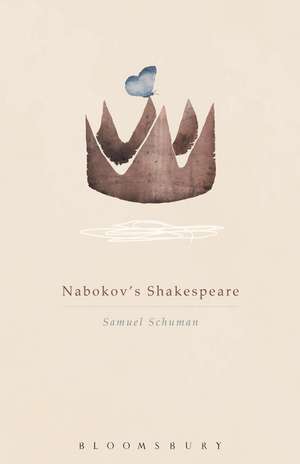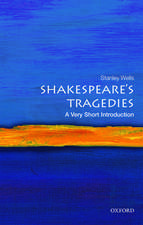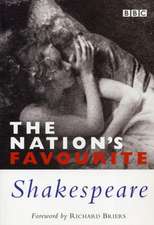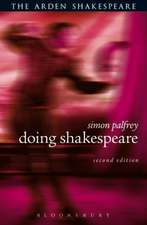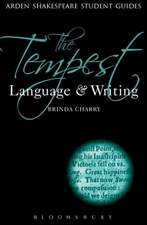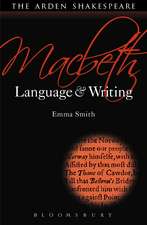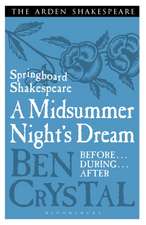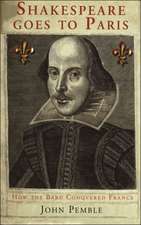Nabokov's Shakespeare
Autor Samuel Schumanen Limba Engleză Paperback – 24 sep 2014
| Toate formatele și edițiile | Preț | Express |
|---|---|---|
| Paperback (1) | 190.06 lei 3-5 săpt. | |
| Bloomsbury Publishing – 24 sep 2014 | 190.06 lei 3-5 săpt. | |
| Hardback (1) | 829.82 lei 6-8 săpt. | |
| Bloomsbury Publishing – 24 sep 2014 | 829.82 lei 6-8 săpt. |
Preț: 190.06 lei
Preț vechi: 221.76 lei
-14% Nou
Puncte Express: 285
Preț estimativ în valută:
36.37€ • 37.83$ • 30.03£
36.37€ • 37.83$ • 30.03£
Carte disponibilă
Livrare economică 24 martie-07 aprilie
Preluare comenzi: 021 569.72.76
Specificații
ISBN-13: 9781628922714
ISBN-10: 1628922710
Pagini: 208
Dimensiuni: 140 x 216 x 23 mm
Greutate: 0.27 kg
Editura: Bloomsbury Publishing
Colecția Bloomsbury Academic
Locul publicării:New York, United States
ISBN-10: 1628922710
Pagini: 208
Dimensiuni: 140 x 216 x 23 mm
Greutate: 0.27 kg
Editura: Bloomsbury Publishing
Colecția Bloomsbury Academic
Locul publicării:New York, United States
Caracteristici
Will help students of twentieth-century literature to understand more deeply the influence of Shakespeare
Notă biografică
Samuel Schuman served as the Garrey Carruthers Distinguished Visiting Professor at the University of New Mexico, and Chancellor Emeritus of the University of Minnesota, Morris and the University of North Carolina, Asheville, USA. He is past President of the International Vladimir Nabokov Society and author of Vladimir Nabokov: A Reference Guide. He has published extensively on Nabokov as well as on British Renaissance Drama.
Cuprins
Foreword by Brian BoydIntroduction - Shakespeare, Nabokov, and MeI."The Sun's a Thief:" Nabokov's ShakespeareIntroductionNabokov, English and English LiteratureThemeA Taxonomy of Nabokov's ShakespeareanismsPreviewII.The Russian Works The Tragedy of Mr. Morn"Shakespeare"TranslationsEarly Prose The Wood Sprite Glory, The Gift, Invitation to a Beheading Laughter in the Dark DespairThe English NovelsIII."Which is Sebastian?": What's in a (Shakespearean and Nabokovian) Name?IV.No Left Turn, or Something Rotten the State: Bend Sinister and HamletV.Hurricane Lolita: The Nabokovian TempestVI.Tempest Point on the Bohemian Sea: PNINVII.The Lunatic, the Lover and the Poet: Pale Fire and "Timon of Athens"VIII."O What a Noble Mind:": Ada and HamletIX.The Last NovelsTransparent ThingsLook at the Harlequins!X.A Miscellany of Other English WorksThat in Aleppo OnceEugene OneginSpeak, MemoryReviews and NotesXI.Concluding ThoughtsAppendix 1 - A Quantitative ApproachWorks ConsultedNotesIndex
Recenzii
Shakespeare and Nabokov are literary giants in their respective cultural traditions. In his spectacular Nabokov's Shakespeare, Samuel Schuman presents a remarkable face-off and solves several of the remaining riddles about the writers' literary enigmas.
Samuel Schuman has provided a fine-grained analysis of Shakespearean motifs and allusions in Nabokov's work. His careful interpretation of Shakespearean references offers fresh illumination on such major works as Lolita, Pale Fire, and Ada.
Nabokov's Shakespeare provides readers with "a very fantastical banquet," as Benedick puts it in Much Ado about Nothing. This exciting, accessible, wide-ranging volume sparkles with the glint of literary discovery as it traces the many ways in which one great writer can read another. Samuel Schuman confidently explores the infinite variety of Nabokov's evocations, citations, homages, parodies, and translations of Shakespeare, across the entire range of his Russian and especially his English works. After reading Nabokov's Shakespeare, you will better appreciate English literature's two most brilliant wordsmiths. And you will indeed know Nabokov's Shakespeare-including the themes of loss, banishment, and art's transcendent magic that he shared with his predecessor, the particular scenes from the plays that he staged and restaged in his own works, and even his favorite line in all of Shakespeare's writing. Schuman's book offers endless riches to Nabokov scholars, and to anyone who simply loves literature.
Samuel Schuman is one of the most trustworthy, measured, and responsible Nabokov critics whose scholarly credibility in both Shakespearean and Nabokovian circles makes him singularly suited to account for Nabokov's insistent and purposive use of Shakespeare's works in the texture and structure of his own. And Schuman's project is a very timely one: all previous work on Nabokov and Shakespeare has been done mainly through a handful of essays, all of which are well done but deliver only glancing blows to the topic. The great strength of this book is the comprehensive treatment of Shakespeare's presence in Nabokov's work, and Nabokov's Shakespeare would be worth buying just for Schuman's wide-ranging and convincing explication of the long Shakespearean discussion and the Krug/Hamlet parallels in Bend Sinister. The book's other strengths are Schuman's conscientious scholarship, clear principles of organization and argument, and the writing's stout resistance of academic hyperbole and unproductive theoretical complexity.
A well-known Nabokov scholar, who also wrote Vladimir Nabokov: A Reference Guide (1979), Schuman has done a fine job of explicating Shakespeare's role in Nabokov's oeuvre. Nabokov's earliest reference to the Bard is the 1924 poem "Shakespeare." That work was soon followed by a five-act play, The Tragedy of Mr. Morn, that echoes Shakespeare in its structure, form, and intonations . This is solid scholarship on an intriguing writer. Summing Up: Recommended. Upper-division undergraduates through faculty.
Samuel Schuman has provided a fine-grained analysis of Shakespearean motifs and allusions in Nabokov's work. His careful interpretation of Shakespearean references offers fresh illumination on such major works as Lolita, Pale Fire, and Ada.
Nabokov's Shakespeare provides readers with "a very fantastical banquet," as Benedick puts it in Much Ado about Nothing. This exciting, accessible, wide-ranging volume sparkles with the glint of literary discovery as it traces the many ways in which one great writer can read another. Samuel Schuman confidently explores the infinite variety of Nabokov's evocations, citations, homages, parodies, and translations of Shakespeare, across the entire range of his Russian and especially his English works. After reading Nabokov's Shakespeare, you will better appreciate English literature's two most brilliant wordsmiths. And you will indeed know Nabokov's Shakespeare-including the themes of loss, banishment, and art's transcendent magic that he shared with his predecessor, the particular scenes from the plays that he staged and restaged in his own works, and even his favorite line in all of Shakespeare's writing. Schuman's book offers endless riches to Nabokov scholars, and to anyone who simply loves literature.
Samuel Schuman is one of the most trustworthy, measured, and responsible Nabokov critics whose scholarly credibility in both Shakespearean and Nabokovian circles makes him singularly suited to account for Nabokov's insistent and purposive use of Shakespeare's works in the texture and structure of his own. And Schuman's project is a very timely one: all previous work on Nabokov and Shakespeare has been done mainly through a handful of essays, all of which are well done but deliver only glancing blows to the topic. The great strength of this book is the comprehensive treatment of Shakespeare's presence in Nabokov's work, and Nabokov's Shakespeare would be worth buying just for Schuman's wide-ranging and convincing explication of the long Shakespearean discussion and the Krug/Hamlet parallels in Bend Sinister. The book's other strengths are Schuman's conscientious scholarship, clear principles of organization and argument, and the writing's stout resistance of academic hyperbole and unproductive theoretical complexity.
A well-known Nabokov scholar, who also wrote Vladimir Nabokov: A Reference Guide (1979), Schuman has done a fine job of explicating Shakespeare's role in Nabokov's oeuvre. Nabokov's earliest reference to the Bard is the 1924 poem "Shakespeare." That work was soon followed by a five-act play, The Tragedy of Mr. Morn, that echoes Shakespeare in its structure, form, and intonations . This is solid scholarship on an intriguing writer. Summing Up: Recommended. Upper-division undergraduates through faculty.
